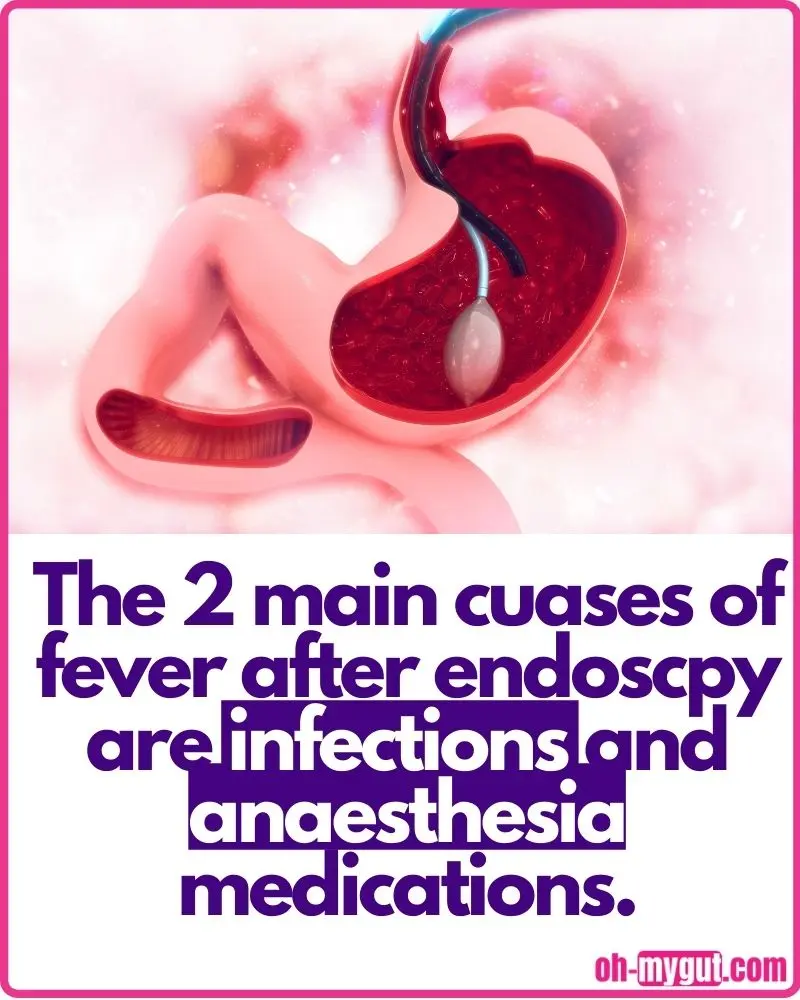Fever Or Cold Symptoms After Endoscopy: Causes, When To Worry.
The two main causes of fever after an endoscopy are infection and anesthesia. serious causes can also happen such as aspiration pneumonia and perforation. People that are older in age and with impaired immunity are at a higher risk of fever after endoscopy.
Today, we will discuss the most common causes of fever after endoscopy in detail:
- Gastrointestinal infections and bacteremia.
- Anesthetic medications causing fever.
- Aspiration Pneumonia.
- Perforation.
- Low immunity.

1- Gastrointestinal infection.
The risk of infection after diagnostic endoscopy is usually low. Some endoscopic procedures are associated with a higher risk of infection (such as esophageal and stomach varices injection and ligation.
Infection can be acquired through many mechanisms:
- Contamination or under-sterilization of the endoscope.
- Contamination of the procedure wound with the bacteria inside the gut.
- Translocation of bacteria from your gut into the bloodstream (bacteremia).
Infection is the most common cause of fever after endoscopy. certain types of endoscopies and endoscopic procedures have a higher risk of fever after endoscopy:
- Injection of gastric fundal varices (dilated vessels in the wall of the stomach) in people with liver cell failure or portal hypertension.
- Ligation or injection of esophageal varices (dilated vessels in the wall of the esophagus).
- Side-view duodenoscope (ERCP) can cause pancreatitis and subsequently fever.
- Endoscopic ultrasound with fine-needle aspiration (EUS-FNA).
- Endoscopic procedures such as taking a biopsy or removing a polyp.
- Gastrostomy
Sterilization and disinfection of endoscopies can be challenging despite following standard instructions. This is because the endoscope is heat-sensitive and has multiple internal small channels.
Common infections that can be acquired by endoscopy include:
- Hepatitis B virus
- Hepatitis C virus.
- E. coli.
Symptoms include:
- Fever starting a few hours or days after endoscopy.
- Abdominal pain.
- Diarrhea may occur.
- Severe forms may present with acute hepatitis, jaundice, and elevated liver enzymes.
- Nausea and vomiting may occur.
2- Anaesthesia or sedation medications.
Another cause of fever during or after endoscopy is anesthesia. Two broad types of anesthesia for endoscopy present:
- Sedation: It can range from conscious light sedation to deep sedation.
- General anesthesia: you’re completely unresponsive.
Many sedative and anesthetic mediations (such as Propofol and inhaled anesthetic drugs) can impair temperature control.
It can cause fever or hypothermia (low body temperature). this usually occurs during and for the first few hours after endoscopy.
Whether you have sedation or general anesthesia during endoscopy, fever is a risk.
Your body usually responds by sweating and skin flushing to get rid of fever or hyperthermia.
if you are experiencing high-grade fever in the first few hours after endoscopy, call your doctor immediately.
The condition is usually self-limiting and can be controlled by antipyretics (such as paracetamol).
Severe forms of fever are called hyperthermia. Extreme fever with subsequent loss of consciousness requires emergency medical management.
3- Lung infection.
With sedation and general anesthesia, you may become unable to protect your airways.
Also, the endoscopic procedure itself carries a risk of aspiration of gastric contents into the airways. The risk is especially higher in people of advanced age (ref)
Aspiration of gastric contents into your trachea and lungs may cause lung inflammation (pneumonia). which causes fever after a day or few days of endoscopy.
Symptoms may include:
- Difficulty breathing (shortness of breath).
- cough.
- Expectoration of sputum.
- chest pain.
- Fever or cold symptoms.
- Body aches.
- Wheezing after endoscopy.
If you suspect a chest infection after the endoscopy, ask for help from your health care provider. Your doctor will assess the condition and may request a chest radiograph (an x-ray or chest CT).
If pneumonia is confirmed, your doctor will prescribe antibiotics and other medications to control the infection.
In severe cases (especially in people with low immunity), Hospital admission and monitoring may be required to prevent further complications.
4- Perforation.
A tear in the wall of your esophagus, stomach, or duodenum can occur during endoscopy.
The most common site of perforation by endoscopy is the esophagus. However, the risk of perforation is very low.
A perforation will result in a leak of gastrointestinal tract contents into the outside. This will provoke an inflammatory process and can cause fever after endoscopy.
The risk factor of perforation during endoscopy:
- Esophageal stricture dilatation.
- Diagnostic endoscopy with Rigid endoscope (endoscopy trauma).
- Sclerotherapy.
- Pneumatic dilation for achalasia.
- Tumors or previous radiotherapy of the esophagus or chest.
The perforation can be detected by the doctor during the procedure. However, it can be overlooked.
symptoms of perforation include:
- Severe chest or abdominal pain immediately after recovery from the endoscopy.
- Vomiting.
- Fever after endoscopy.
- Bleeding (vomiting of blood or blackish stools).
- Severe cough and shortness of breath.
- Rapid heartbeats (palpitations).
Perforation is an emergency medical condition. Call your doctor immediately if you have suspicious symptoms.
The condition is usually treated by surgery or the insertion of an esophageal stent. Admission to the hospital and Nothing per mouth (Nil Per Os) is required.
5- Low immunity.
In many cases, the problem is with your immunity, not the endoscopy procedure. Some people may have low immunity which carries a higher risk of infection.
Low or high-grade fever after endoscopy can occur due to bacteremia or infection following the procedure.
Bacteremia is the translocation of bacteria from your gastrointestinal tract into the blood.
Under normal circumstances, bacteremia is transient and may cause a transient low-grade fever.
In people with impaired immunity, this can progress to severe infection and sepsis.
Some examples of conditions of impaired immunity:
- End-stage liver disease (liver cirrhosis).
- End-stage renal disease (chronic renal failure or dialysis patients).
- Cancer patients.
- People receiving immunosuppressive medications or chemotherapy.
- Autoimmune diseases.
- AIDS (HIV infection).
The above conditions are examples of conditions of low immunity. They’re independent risk factors for fever and infection after endoscopy.
Warning signs of fever after endoscopy.
- High-grade fever.
- Persistent vomiting after endoscopy.
- Severe abdominal or chest pain after endoscopy.
- Vomiting of blood.
- Passage of reddish or blackish stools after endoscopy.
- shortness of breath.
- Severe cough after endoscopy.
- Palpitations (rapid hearbeats).
- Confusion or dizziness with a high fever.
Treatment of fever after endoscopy depends on identifying the cause.
- Transient bacteremia with low-grade fever is usually self-limiting.
- Prophylactic antibiotics in high-risk procedures are recommended (as with variceal infections, ERCP).
- Fever can be controlled by Paracetamol (Tylenol) every 4 to 6 hours.
- Fever due to anesthesia medication may need special management and medications.
- If you experience any warning signs, call your doctor immediately.
Related Posts:
- 7 Stomach Cancer Symptoms in Women & When To Worry.
- 5 Gallbladder Symptoms in Men& When to Worry…
- Unexplained Diarrhea & No Other Symptoms: 9 Common Causes.
- Pancreatic diarrhea: 7 Facts about its Causes,…
- 5 Gall Bladder Symptoms in Women (Gastroenterologist…
- Pancreas Problems: 5 Main Conditions, Symptoms, & Signs







